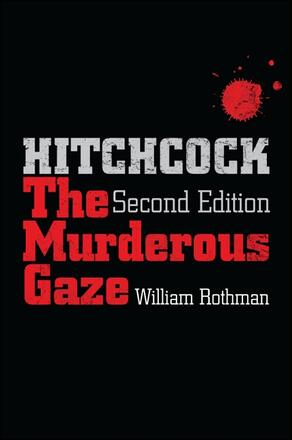
Hitchcock, Second Edition
The Murderous Gaze
Alternative formats available from:
An expanded edition of a classic work of film criticism, with a provocative and eloquent new chapter on Marnie, Hitchcock's most heartfelt--and most controversial--film.
Description
First published in 1982, William Rothman's Hitchcock is a classic work of film criticism. Written in an engaging style that is philosophically sophisticated yet free of jargon, and using over nine hundred images from the films to illustrate and back up its critical claims, the book follows six different Hitchcock films as they unfold, moment by moment, from first shot to last.
In addition to a thoughtful new preface and the original readings of The Lodger (1927), Murder! (1930), The 39 Steps (1935), Shadow of a Doubt (1943), and Psycho (1960), this expanded edition includes a groundbreaking new chapter—now the book's longest—on Marnie (1964), Hitchcock's most heartfelt yet most controversial film. Hitchcock never tired of quoting Oscar Wilde's line, "And all men kill the thing they love. " Dark moods therefore prevail in the five original chapters, culminating in the reading of Psycho, but in demonstrating how Marnie overcomes, or transcends, the murderous aspect of Hitchcock's art, this new chapter balances the scales and gives an important new dimension to the book.
With exemplary precision, Hitchcock, Second Edition shows how Hitchcock films express, cinematically, serious thoughts about such matters as the nature and relationships of love, murder, sexuality, marriage, and theater—and about their own medium. In so doing, it keeps faith with the idea that Hitchcock was a master, perhaps the master, of what he called the "art of pure cinema. " However, insofar as it investigates philosophically the conditions of authorship in the medium of film, it is an auteurist study unlike any other. By attending to the films themselves and to the ways we experience them, rather than allowing some theory to dictate what to say about them, the book proves the fruitfulness of an approach that is open and responsive to the ways serious films are capable of teaching us how to think seriously about them.
William Rothman is Professor of Motion Pictures and Director of the Graduate Program in Film and Media Studies at the University of Miami. His books include Cavell on Film and Three Documentary Filmmakers: Errol Morris, Ross McElwee, Jean Rouch, both also published by SUNY Press.
Reviews
"…Rothman's extremely detailed … style makes for a captivating read, and it proves that when writing is triggered by an author's passion readers will more easily understand content. " — Film Matters
Praise for Hitchcock: The Murderous Gaze
"Perceptive, graceful, illuminating … As a model of how to view a movie it has few equals. " — CHOICE
[An] eloquent, intelligent work. " — Philip French, Times Literary Supplement
"This is academic film criticism of the very highest order; the readings are inclusive and illuminating, and the writing is at once polished and congenial. " — Worcester Sunday Telegram
"William Rothman's Hitchcock: The Murderous Gaze is the best treatment of Hitchcock to date. It addresses what is unique about Hitchcock's films … [in order] to establish the centrality of Hitchcock to the art of making films … The book rewards the reader by providing pleasures that convey, to a remarkable degree, the exhilarating experience of viewing a Hitchcock film … Most readers, I am convinced, will have the sense that Rothman has really captured Hitchcock, and that he has shown Hitchcock to be more masterly, and more profound, than they ever imagined … Rothman's book, clear, passionate, and witty, neither reduces the films it studies to a set of codes nor is itself written in code. " — Paul Thomas, American Film
"The whole book in fact is richly suggestive—perhaps more fully responsive to Hitchcock's complexities than any previous account—and it deserves to be widely discussed. " — Douglas Pye, Journal of American Studies
"Rothman's approach is engagingly far from dictatorial; his readings, crammed with useful questions rather than inflexible assertions, should stimulate … Rothman's is the best desert-island reading the Hitchcock fan could wish for. " — Philip Strick, Films and Filming
"Rothman's study is like no other I have read of Hitchcock, or any other director for that matter … The book represents an immense labor of love and devotion. " — Forsyth Hardy, Literary Review